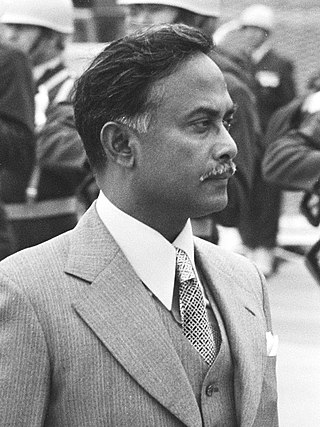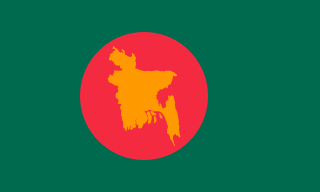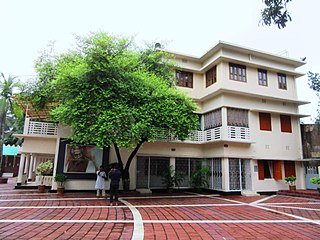
Sheikh Mujibur Rahman, popularly known by the honorific prefix Bangabandhu was a Bangladeshi politician, revolutionary, statesman, activist and diarist. As a politician, Mujib had held continuous positions as president or prime minister from April 1971 until his assassination in August 1975: as president from 1971 to 1972 and briefly from 1975 until his death, and as prime minister from 1972 to 1975. Mujib successfully led the Bangladeshi independence movement and restored the Bengali sovereignty after over two centuries following the Battle of Plassey in 1757, for which he is honoured as the 'Father of the Nation' in Bangladesh. In 2011, the fifteenth constitutional amendment in Bangladesh referred to Sheikh Mujib as the Father of the Nation who declared independence; these references were enshrined in the fifth, sixth, and seventh schedules of the constitution. His Bengali nationalist ideology, socio-political theories, and political doctrines are sometimes called Mujibism.

Ziaur Rahman was a Bangladeshi military officer and politician who served as the President of Bangladesh from 1977 until his assassination. He was the founder of the Bangladesh Nationalist Party (BNP) and served as its chairman until his assassination. He previously served as the second chief of army staff from 1975 to 1978 with a minor break.
Syed Nazrul Islam was a Bangladeshi politician and a senior leader of the Awami League. During the Bangladesh Liberation War, he was declared as the Vice President of Bangladesh by the Provisional Government. He served as the Acting President in the absence of Sheikh Mujibur Rahman.
Khondaker Mostaq Ahmad was a Bangladeshi politician. He was the fourth president of Bangladesh from 15 August to 6 November 1975, after the assassination of Sheikh Mujibur Rahman. He was involved in the assassination of Bangabandhu Sheikh Mujibur Rahman on 15 August 1975. He took on the role of president immediately after the assassination, praised the assassins as "sons of the sun" and put cabinet ministers loyal to Sheikh Mujibur Rahman in jail.

Tajuddin Ahmad was a Bangladeshi politician and statesman. He led the Provisional Government of Bangladesh as its prime minister during the Bangladesh Liberation War in 1971 and is regarded as one of the most instrumental figures in the birth of Bangladesh.
The Swadhin Bangla Biplobi Parishad was an armed underground student political group secretly organized in 1961 by Serajul Alam Khan, a key founder of Bangladesh, that worked to wage an armed secessionist struggle against Pakistani rule and achieve the independence of East Pakistan as "Bangladesh".

The first president of Bangladesh, Sheikh Mujibur Rahman, and most of his family were killed during the early hours of 15 August 1975 by a group of Bangladesh Army personnel who invaded his Dhanmondi 32 residence as part of a coup d'état. Minister of Commerce, Khondaker Mostaq Ahmad, immediately took control of the government and proclaimed himself president. The assassination marked the first direct military intervention in Bangladesh's civilian administration-centric politics. 15 August is National Mourning Day, an official national holiday in Bangladesh.
The Bangladesh Liberation War started on 26 March 1971 and ended on 16 December 1971. Some of the major events of the war are listed in the timeline below.

The Jatiya Rakkhi Bahini was a Bangladeshi para-military force formed in 1972 by the Sheikh Mujibur Rahman government.
Sheikh Fazlul Haque Moni was a Bangladeshi politician. He was one of the nephews of Bangabandhu Sheikh Mujibur Rahman the founding father of Bangladesh. He was the founder of Mujib Bahini Bangladesh Liberation Force-BLF one of the major guerrilla forces of the Bangladesh Liberation War and also the founder of Bangladesh Awami Jubo League, the youth wing of Bangladesh Awami League.
The Mujib Bahini, also known as Bangladesh Liberation Force (BLF), was an armed force formed during the Bangladesh Liberation War to fight against Pakistan in 1971. The force was mainly composed of activists drawn from the Awami League and its student front, the Chhatra League. At its height, it had reportedly 13,000 members. It was organised with the active assistance of Major General Sujan Singh Uban of the Indian Army. Serajul Alam Khan and Sheikh Fazlul Haque Mani, Tofael Ahmed and Abdur Razzaq were the organizers of this force.
Kazi Mohammed Shafiullah Bir Uttam, also known as K. M. Shafiullah, is a retired Bangladeshi general, former Chief of Army Staff of the Bangladesh Army, and former member of parliament.

The Independence Day of Bangladesh is celebrated on 26 March as a national holiday in Bangladesh. It commemorates the country's declaration of independence from Pakistan in the early hours of March 26, 1971.

The independence of Bangladesh was declared on 26 March 1971, at the onset of the Bangladesh Liberation War by Bangabandhu Sheikh Mujibur Rahman; the following day the declaration was broadcast by Major Ziaur Rahman from Swadhin Bangla Betar Kendra radio station in kalurghat. On 10 April, the Provisional Government of Bangladesh issued a proclamation on the basis of the previous declaration and established an interim constitution for the independence movement.

The 7th March Speech of Bangabandhu, or the 7/3 Speech, was a public speech given by Sheikh Mujibur Rahman, the Founding Father of Bangladesh on 7 March 1971 at the Ramna Race Course in Dhaka to a gathering of over two million (2,000,000) people. It was delivered during a period of escalating tensions between East Pakistan and the powerful political and military establishment of West Pakistan. In the speech, Bangabandhu informally declared the independence of Bangladesh, proclaiming: "The struggle this time, is a struggle for our liberty. The struggle this time, is a struggle for our independence." He announced a civil disobedience movement in the province, calling for "every house to turn into a fortress".

The Provisional Government of Bangladesh, popularly known as the Mujibnagar Government ; also known as the Bangladeshi government-in-exile, was a provisional government that was established following the proclamation of independence of East Pakistan as Bangladesh on 10 April 1971. Headed by prime minister Tajuddin Ahmad, it was the supreme leadership of the Bangladeshi liberation movement, comprising a cabinet, a diplomatic corps, an assembly, an armed force, and a radio service. It operated as a government-in-exile from Kolkata.

The Sheikh family of Tungipara is one of the two most prominent Bangladeshi political families, other being the Zia family. The family primarily consists of Sheikh Mujibur Rahman, Sheikh Hasina, Sheikh Rehana and their relatives. Their political involvement has traditionally revolved around the Bangladesh Awami League.

The 15 August 1975 Bangladesh coup d'état was a military coup launched by mid ranking army officers in Bangladesh on 15 August 1975. The officers were part of a conspiracy to assassinate Sheikh Mujibur Rahman, the founding father of Bangladesh, who led the independence struggle during the Bangladesh Liberation War and later served as the first and fourth president and later in between his two presidential terms served as the second prime minister of Bangladesh from April 1971 until his assassination in August 1975. Sheikh Mujibur Rahman and most of his family members were killed during the coup, with the exception of his two daughters Sheikh Hasina and Sheikh Rehana.
The non-cooperation movement of 1971 was a historical movement in then East Pakistan by the Awami League and the general public against the military government of Pakistan in March of that year. After the announcement of the suspension of the session of the National Assembly of Pakistan on 1 March, the spontaneous movement of the people started, but officially on the call of Sheikh Mujibur Rahman, the non-cooperation movement started on 2 March and continued until 25 March. The movement lasted for a total of 25 days.
Abdul Majed was a Bangladeshi military officer who was convicted for his role in the assassination of Sheikh Mujibur Rahman, the founding president of Bangladesh.










